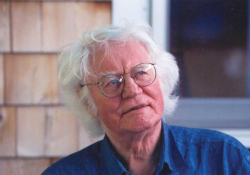A Tribute to Álvaro Mutis Jaramillo

The editors and staff of World Literature Today were greatly saddened to hear the news of Álvaro Mutis’s passing this week; the celebrated Colombian-born poet and novelist died on September 22 in Mexico City at the age of ninety. We fondly remember his visit to the University of Oklahoma in fall 2002 to accept the Neustadt International Prize for Literature, where he spoke with great passion and humor about his life as a writer. It was clear from the translators and scholars who gathered in Norman to honor his life and work—Edith Grossman, Gerald Martin, Alastair Reid, William Siemens, and James Alstrum—that both the man and his work were much beloved. The following excerpts appeared in the July 2003 issue of WLT.
“Un bel morir . . .”
Álvaro Mutis
Upright in a boat, stilled in the middle of a river
whose waters flow past in a slow eddying
of mud and roots,
the missionary blesses the chief’s family.
Fruit, glass beads, animals, and jungle
all receive the succinct signs of blessing.
When the hand descends,
I will have died in my bedroom
whose windows rattle when the tram passes
and the milkman comes back in vain for his empty bottles.
By then not much of our story will be left –
some pictures in disarray,
some letters hidden somewhere or other,
what was said that day you went naked in the country.
All that will keep fading away to oblivion,
and a monkey’s chatter,
the whitish trickle of sap
from the wounded bark of the rubber tree,
the slap of water against the moving keel,
will be remembered more than our long lovemaking.
Translation from the Spanish
By Alastair Reid
“One has to read but one page from any of his books to understand everything. All of Álvaro’s works, his very life, are the products of a clairvoyant, one who knows with certainty that we will never recover paradise lost.”—Gabriel García Márquez, World Literature Today, September 2004
Álvaro Mutis on Himself
Álvaro Mutis delivered the following address at the award banquet for the Neustadt International Prize for Literature in October 2002. To read the Spanish original, see “Mutis por Mutis.”
I was born in Bogotá on August 25, 1923, the feast day of Saint Louis, king of France. I do not deny the influence of my patron saint on my devotion to monarchies. I completed early studies in Brussels, then returned to Colombia for periods that were at first vacations, and, later—as they became more and more extended—I lived on a coffee and sugar plantation that my maternal grandfather had founded. It was called “Coello” and was located in the foothills of the Central Highlands. All that I have written is destined to celebrate and perpetuate that corner of the tierra caliente from which emanates the very substance of my dreams, my nostalgias, my terrors, and my fortunes. There is not a single line of my work that is not connected, in a secret or explicit way, to the limitless world that for me is that corner of the region of Tolima in Colombia.
In a final attempt to earn my high-school diploma, I enrolled in the Colegio Mayor de Nuestra Señora del Rosario in Bogotá. My professor of Spanish literature was the noted Colombian poet Eduardo Carranza, and two blocks from the school were the pool halls of the Café Europa and the Café Paris. Carranza’s classes were for me an unforgettable and passionate initiation to poetry. Billiards and poetry took precedence over my acquiring that much-sought-after diploma.
Alternating his poems with my own, Carlos Patiño and I published a chapbook titled La Balanza (The scales), which we distributed ourselves among our bookseller friends on April 8, 1948. The following day, our publication went out of print as the result of a fire. On April 9 the “Bogotazo” occurred when the downtown of the city was set ablaze by the enraged supporters of presidential candidate Jorge Eliécer Gaitán, who was assassinated that day in the capital. In 1953 —after publishing some poems, the first in the journal La Razón at the hands of Alberto Zalamea, and others in the Sunday supplement to El Espectador, thanks to Eduardo Zalamea Borda, which appeared in the collection “Poets of Spain and America” published by Losada, directed by Rafael Alberti and Guillermo de la Torre in Buenos Aires—my verse collection Los elementos del desastre (The elements of the disaster) was released.
In 1956 I traveled to Mexico, where I reside today. Octavio Paz, who had written laudatory commentary on my poetry, opened doors for me in literary supplements and magazines. Paz himself presented my work in a generous essay on my book Reseña de los Hospitales de Ultramar (A report on the overseas hospitals), published in 1958 as a supplement to number 56 of the magazine Mito, directed in Colombia by Jorge Gaitán Durán. In 1959 Diario de Lecumberri (Diary of Lecumberri) came out, published by the Universidad Veracruzana in its “Fiction” series. In 1964 Ediciones Era, also in Mexico, published a collection of poems, all written in Mexico, entitled Los trabajos perdidos (Lost endeavors). Two works appearing simultaneously in 1973 were Summa de Maqroll el Gaviero, which brought together all my poetry up to that date, published by Barral Editores of Barcelona, and La Mansión de Araucaíma (The mansion of Araucaíma), released by Sudamericana in Buenos Aires, which collected all my short stories. In 1978 Seix Barral of Barcelona produced a new expanded edition of the collection that included the short story “El último rostro” (The last face). In 1982 Mexico’s Fondo de Cultura Económica brought out a book of poems entitled Caravansary in its Tierra Firme collection. In 1984 the same publisher produced another volume of poetry in the same series, Los emisarios (The emissaries), and in 1985 Cátedra of Madrid released Crónica regia y alabanza del reino (Royal account and praise of the realm), poems dedicated to King Phillip II, his family, and court.
In these last works I explore—not without difficulties, vacillations, and flashes of doubt—a new way of telling the same old thing, that which will remain the same and which, for me, is the only thing worth telling: that the ghosts from my avid and scattered readings during childhood at the Coello plantation visit me with invariable frequency—ghosts born in large part in the corners of the history of the West and in the golden decadence of Byzantium, mixed together, always, by the lukewarm mists of the coffee plantations.
In 1987 and with the same purpose of rescuing vast periods from my past, I published Un homenaje y siete nocturnos (An homage and seven nocturnes), brought out by El Equilibrista of Mexico and Pamiela of Pamplona. Subsequently, I resolved to try my hand at the short story by expanding some of the prose pieces I had written on Maqroll el Gaviero (Maqroll the Lookout), a character who, beginning with the first poems I wrote, has visited me sporadically. Out of this enterprise was born Empresas y tribulaciones de Maqroll el Gaviero, which includes the following novellas: La nieve del almirante (1986; Eng. The Snow of the Admiral, 1995), Ilona llega con la lluvia (1987; Eng. Ilona Comes with the Rain, 1995), Un bel morir (1989; Eng. Un Bel Morir, 1995), La última escala del Tramp Steamer (1989; The Tramp Steamer’s Last Port of Call, 1995), Amirbar (1990; Eng. Amirbar, 1995), Abdul Bashur, soñador de navíos (1991; Eng. Abdul Bashur, Dreamer of Ships, 1995), and Tríptico de mar y tierra (1993; Eng. Triptych on Sea and Land, 1995). After being published separately, in Spain as well as in Latin America, the works were released as two volumes with the publishing house Siruela in 1993 and in a single volume with Alfaguara in 1995. [Editorial note: In English, all seven novellas are available in The Adventures and Misadventures of Maqroll (New York Review Books, 2002).]
In 1988 Mexico’s Fondo de Cultura Económica published short stories and essays under the title La muerte del estratega (The death of the strategist), and in 1990 it brought out Summa de Maqroll el Gaviero, which collected all my poetry up to that time. The volume was reprinted in Spain by Visor in 1992.
Of my prose works, there are translations into English, French, German, Italian, Portuguese, Danish, Swedish, Polish, Greek, Dutch, and Turkish. Of my poetry, complete translations exist in French, Italian, and Romanian, and there are anthologized versions in Chinese, Russian, English, Greek, and German.
I have never taken part in politics; I have never voted, and the last event in the political realm that truly concerned me or had anything to do with me in a clear and honest way is the fall of Constantinople at the hands of the Turks on May 29, 1453, nor have I failed to recognize that I still have not gotten over the trip to Canossa by the Salic King Henry IV in January 1077 to pay homage to the Sovereign Pontiff Gregory VII—a trip of such ill-fated consequences for the Christian West. Hence, I am a defender of the Holy Roman Empire, monarchic, and legitimist.
Norman, Oklahoma
October 18, 2002
Translation from the Spanish
By David Draper Clark
“If one of the functions of great fiction is to teach us how to live, in his depictions of nature and his descriptions of Maqroll, Álvaro fulfills that duty, without precepts, certainly without dogma, but by sacralized, yet worldly, example.”—Edith Grossman, “Confessions of an Unreconstructed Romantic,” WLT 77:2 (July 2003)
Nominating Statement for Álvaro Mutis, Laureate of the 2002 Neustadt International Prize for Literature
Juan Gustavo Cobo Borda
Who among today’s writers in the Spanish language is capable of corresponding, with a calm enthusiasm, with authors as varied as the Italian Giuseppe Ungaretti, the Frenchman Francis Ponge, the Pole Czeslaw Milosz, or the Brazilian João Cabral de Melo Neto, not to mention those who have been or are presently the author’s close friends—people like Octavio Paz and Gabriel García Márquez?
The Colombian Álvaro Mutis (born in 1923) is without doubt a contemporary writer who possesses a cultural background sufficiently broad and universal to transcend languages and borders. This cosmopolitanism allows him to moderate a compelling debate where poetry and its interplay with the destiny of humankind in this tenuous world succeeds in bringing together participants from all walks of life. His work has been translated into almost twenty languages, including English, French, German, Italian, Portuguese, Japanese, Greek, Hebrew, Turkish, Polish, Dutch, Swedish, and Danish. Such international acclaim fits seamlessly into the ideal of a world community of literature that the Neustadt Prize endeavors to foster and recognize.
Moreover, Mutis’s poetry, short stories, novels, and essays reflect a plethora of historical influences, beginning with the Bible, extending to the cultures of Islam and Byzantium, and finally arriving at such seminal figures in Latin American history as Simón Bolívar—all of which embody and illuminate the complex relationship between Europe and America. A universal dialogue of cultures that comes alive in his essays and footnotes reflects Mutis’s intimate understanding of Russian literature, French history, or the development of the novel in the United States, without ever distorting or underestimating the pivotal role of Spain in the formation of Latin America.
Mutis represents a rare blend of the cosmopolitan and the universal on the one hand and Latin America’s unique local flavor on the other. On a par with Jorge Luis Borges, Mutis is just as capable of appreciating, understanding, and evaluating in his literary creations the various nations that a broad world offers us as readers.
There is another argument for championing Mutis’s work for the Neustadt Prize: the central figure who brings all this together and endows it with its unique character is a protagonist named Maqroll El Gaviero (Maqroll the Lookout). Marginalized, out of place, adrift in the rough seas of an indifferent world, his adventures are both pilgrimages and farces, undertaken with lucid and penetrating fatalism.
These hopes, clairvoyant and stripped of all self-delusion, go hand in hand with a sober and sublime pathos toward the illusions to which human beings cling so fiercely, and that make this endurance of hope one of the most perfect creations of twentieth-century Latin American literature. Maqroll becomes, for readers the world over, a compelling and indispensable being.
All this occurs within the teeming framework of the tropics, a burning landscape where splendor mixes with the limits of human endurance. The fragileness of memory and the overwhelming force of untamed nature devour both the creations and the cherished beliefs of man. Violence and desire channel a passionate search for those traits that give rise to the stubborn obsession which leads individuals to strive to make their lives—in the midst of precarious and conflicting societies—more rational and enduring. A most ancient awareness confronts a world in perpetual crisis and renewal. From this have sprung the vibrant pages of La Nieve del Almirante (1986; Eng. The Snow of the Admiral, 1995), Ilona llega con la lluvia (1987; Eng. Ilona Comes with the Rain], 1995), Un bel morir (1989; Eng. Un Bel Morir, 1995), La última escala del Tramp Steamer (1989; The Tramp Steamer’s Last Port of Call, 1995), Amirbar (1990; Eng. Amirbar, 1995), and Abdul Bashur, soñador de navíos] (1991; Eng. Abdul Bashur, Dreamer of Ships, 1995), and also the stories and testimonials found in La mansión de Araucaíma (The house of Araucaíma) and Diario de Lecumberri (The Lecumberri diary).
With a refined literary acumen, Mutis succeeds in creating a saga deeply rooted in verse, such as that of the Summa de Maqroll El Gaviero, so that the plot never alienates itself from the epic and universal aspects of poetry. On the contrary, his fiction provides a sagacious parable of not only the Colombia and the coffee-growing lands of the author’s childhood, but also of a land that resonates throughout all Latin America. He shows to what extent his country has been changed and how its passionately held core values have been incinerated by harsh and painful realities. Nevertheless, Mutis always penetrates beyond those tragedies, in an unambiguous attempt to pose vital questions that force his protagonists to confront their own transcendental existence. From his exile in Mexico he has succeeded in crafting tangible and compelling images of his homeland and of Latin American reality in general. Mutis uses these as a foundation for the construction of a unique world that manages to subsist due to its internal consistency and its faithfulness to the obsessions that have haunted the author since 1948, when he published his first collection of poetry, La balanza (The scales). His characters are the product of a passionate fire rooted in a long acquaintance with Mutis himself.
Although his protagonists create a stage where European and Western influences contend with the hybridization and metamorphosis they undergo upon arriving in the New World, Mutis’s work is never a simple essay about identity. It is a literary journey in which the reader discovers and confronts his- or herself.
The utopia that Mutis proposes is that of an infinite and open reading process similar to the one Joseph Conrad defined when referring to Marcel Proust: one in which analysis has become the creator. A literary journey where a single, definitive reading of the work is all but impossible, thus allowing the book to accompany us through the successive changes in our own lives without becoming irrelevant. By honoring and recognizing Álvaro Mutis, the jurors of the Neustadt International Prize for Literature will be honoring one of the great creative literary minds of our time and, consequently, reaffirming the Neustadt Prize’s own criteria for literary excellence.
Bogotá, Colombia
“Maqroll el Gaviero, a seafarer, adventurer, and all-round drifter, . . . like his master Columbus, misperceived what he saw and began the series of fantasies, misinterpretations, frustrations, and failures that writers have been recording for five hundred years and that we now call Latin American literature.”—Gerald Martin, “Maqroll versus Macondo: The Exceptionality of Álvaro Mutis,” WLT 77:2 (July 2003)










